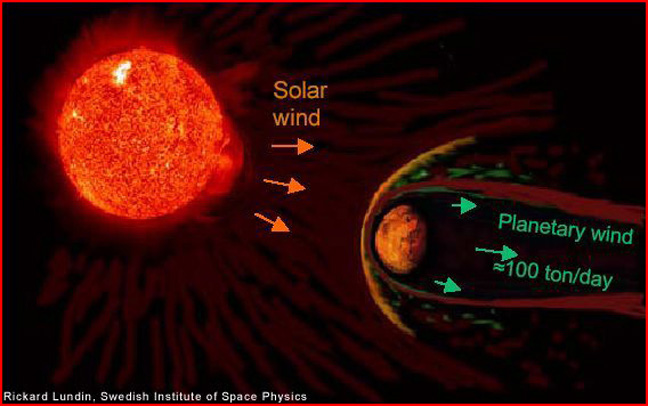
home •
about •
essential guide •
picture of the day •
thunderblogs •
news •
multimedia •
predictions •
products •
get involved •
contact
picture of the day archive subject index
Aug 22, 2006
Missing Air of Mars
Mars has an atmosphere only one hundredth as dense as the Earth's. Before space probes visited it, astronomers expected it to be ten or more times thicker than it is.
ESA's Mars Express orbiter has come up with a possible explanation for the "missing atmosphere" of Mars (see illustration above). The orbiter has been measuring how much atmosphere is being removed from Mars today by solar wind interactions. The total is about 1 kilogram (2.2 pounds) per second, or about 100 tons per day. That's not fast enough to have depleted Mars' atmosphere in the accepted length of Martian history, but presumably when there was more atmosphere, the process happened faster.
But the concept breaks down when you consider Venus. By standard theory, Venus, Earth and Mars have a common origin in the solar nebula. They must have received similar original amounts of air and water. Earth has held on to most of its air and water because it has a magnetic field to protect it from the solar wind. Neither Venus nor Mars have magnetic fields today (although Mars is thought to have had one early in its history). If Venus has been bombarded by solar wind for as long as Earth and Mars, then its atmosphere should have been depleted, too. But it isn't. Instead, Venus' atmosphere is 90 denser than Earth's atmosphere.For the Electric Universe, there is no reason to think of Venus, Earth and Mars as siblings. Nor is it reasonable to think of them as moving along the same orbits for billions of years. Each planet had a separate birth, and even if some or all were born in the same set of plasma instabilities, their characteristics would be dependent on the composition and discharge history of the particular plasma cell in which they were individually formed.
After the birth event, the planets also have a history. Each of them took part in several catastrophic events, the most recent of which is commemorated by prehistoric humans in rock art and in myth. It isn't necessary to suppose that Mars has been losing 100 tons of air a day for billions of years because a few thousands of years ago Mars went through a major event that could have stripped it of its atmosphere and oceans all at once. Plasma interactions were undoubtedly involved; history remembers them as the magical thunder weapon of the warrior hero. But these plasma interactions were much more active than those described above by the Mars Express researchers.
Electric discharge will sometimes take away material (as in the 100 tons per day from the Martian atmosphere). But it can also deposit new material in sorted layers. Or even a whole new atmosphere. As space probes have returned data about density of atmospheres among our solar neighbors, astronomers have been surprised in many cases. Too much air on Venus and Titan; too little on Mars. Earth is considered the "just right" example of how much air a planet should retain for its mass. But electrically speaking, there is no standard initial atmosphere and subsequent changes are not necessarily slow or steady. No wonder the planetary atmospheres don't appear to comply with the astronomical texts.
___________________________________________________________________________Please visit our Forum
The Electric Sky and The Electric Universe available now!

|
|

|
EXECUTIVE EDITORS:
David Talbott, Wallace Thornhill
MANAGING EDITORS:
Steve Smith, Mel Acheson
CONTRIBUTING EDITORS: Dwardu Cardona, Ev Cochrane,
C.J. Ransom, Don Scott, Rens van der Sluijs, Ian Tresman
WEBMASTER: Brian Talbott
Copyright 2006: thunderbolts.info
![]()
home •
thunderblogs •
forum •
picture of the day •
resources •
team •
updates •
contact us

